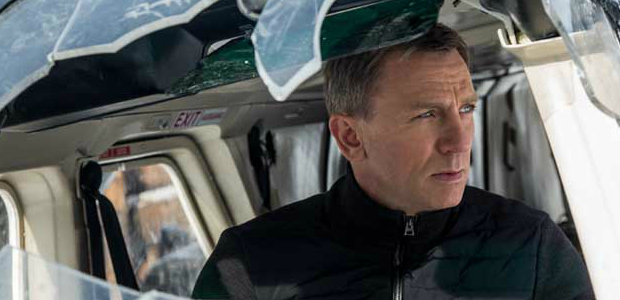Famed screenwriter William Goldman once declared, “If you can’t tell your story in an hour fifty, you’d better be David Lean.” With that, and the recent worrying trend of elongated running times, in mind, the announcement that Spectre would clock in at just under 2 hours and 30 minutes left me feeling instantly tired.
It’s a relief, then, that Sam Mendes -- a composed and holistic filmmaker -- oversees Spectre, and, like the equally Mendes directed Skyfall before it, he never allows the film to drop in enjoyment, providing utterly gorgeous visuals and slick editing throughout while also creating a haunting mood and atmosphere that is unsettling but appealing.
That being said, while Spectre is thoroughly riveting, it never quite ups the ante. Starting off at break-neck speed with a Mexican-based opening sequence that is grandiose, luscious and just downright absorbing (while also paying homage to Touch Of Evil), Spectre then follows this up with a number of captivating action set-pieces that just about match the opener, but never top it. Instead, rather than blasting its way through proceedings, it coolly saunters.
Because of this, while you will almost certainly leave Spectre feeling wholeheartedly entertained, you might also feel just a tiny bit unsatisfied because of the fact that it doesn’t build into an orgasmic climax. But there’s too much else that’s great about Spectre for that to ever come close to derailing it.
At the top of Spectre’s crowning achievements is Daniel Craig, who with his fourth outing as 007 gives the most complete, beguiling yet still complex portrayal of the spy yet. Those of you looking for proof that the average-sized, blonde-haired and blue-eyed Daniel Craig is genuinely the definitive Bond will now forever be able to present Spectre as the definitive piece of evidence. Those of you who are still doubtful probably need to question all of your previous life decisions.
Craig is unrelenting as James Bond, dismissing his superiors and taking advantage of his peers, as well as anyone else that can assist him, to make sure that he can get to his man and save the world. Is he getting the former to preserve his ego? Or saving the latter, because it’s the right thing to do? It’s murky, which makes Spectre that extra bit intriguing.
He does all this while still teasing an emotional depth and fatigue that makes his incarnation glisten with a relatability that sets him apart from previous versions. It’s almost as if John Wayne and Don Draper have merged together, put on a suave suit, and decided to save the world.
Your Daily Blend of Entertainment News
It’s not just Craig who excels, though. The full ensemble band together perfectly, with Lea Seydoux shining as Dr. Madeleine Swann, and Ben Whishaw as Q, Ralph Fiennes as M, Naomie Harris as Moneypenny, and Rory Kinnear’s Bill Tanner proving to be worthy members of Bond’s posse. Meanwhile, Andrew Scott, Monica Bellucci and Jesper Christensen all chime in with cap-doffing performances, too.
Not everything is right with Spectre, though. A lot of its dialogue waffles on for a bit too long as there is always just one line too many during exchanges. Its plot, meanwhile, is preposterously thin -- to the point where I genuinely forgot how Daniel Craig knew where to go at times. Its wit is satisfactory (rather than reaching hilarity), and at times it’s a little bit too easy for this Bond to get out of tight situations.
Plus, while its villainous duo of Dave Bautista and Christoph Waltz, both of whom reek of old-school Bond villains as a brutal henchman and calculated megalomaniac, respectively, flourish on-screen, they’re just not present enough to really make an impact. Waltz is especially terrific when he is paired opposite Daniel Craig. But his threat only simmers. We’re expected to be impressed and afraid, but not enough is provided to back up the supposed menace. It’s no fault of the actors, more that the characters have either been underwritten or savaged in the editing suite.
As a whole, though, Spectre is, if Daniel Craig decides to, the perfect swansong to his James Bond tenure. Having rebooted the character with Casino Royale, taken the obligatory miss-step with Quantum Of Solace, and now with both Skyfall and Spectre merged the franchise’s illustrious history with a stark, complicated modern tone that’s first aim is still to entertain, Craig has helped to solidify James Bond’s importance in the current movie climate. Despite this solid ground, it’s hard to see where the character can go from here. Which actually makes James Bond’s future, with or without Craig, all the more exciting.


